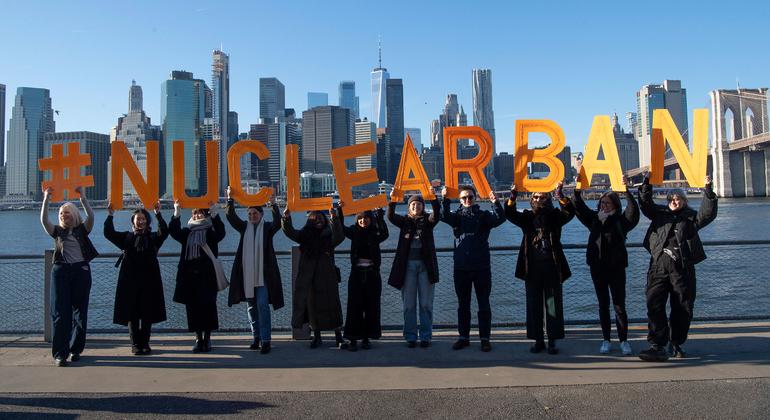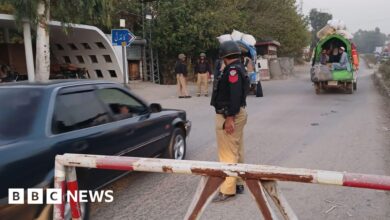Governments call for ‘stop gambling with humanity’s future’ and eliminate nuclear weapons

The summit was held to: commemorate the International Day for the Total Elimination of Nuclear Weaponsobserved every year on September 26.
“There should be no place for these killing devices in our world,” speak UN Secretary General António Guterres.
The nuclear ‘ghost’ is lurking
However, he warned that “not since the worst days of the Cold War has the specter of nuclear weapons cast such a shadow.”
He said that “the nuclear weapons debate has reached a fever pitch” and there have been threats to use nuclear weapons, highlighting fears of a new arms race.
Meanwhile, decades-old rules established against the use, proliferation and testing of nuclear weapons are eroding.

Secretary-General António Guterres meets with survivors of the atomic bombings in Nagasaki and Hiroshima.
Learn from the past
Mr. Guterres said the direct experience of hibakusha — survivors of the atomic bombings of the Japanese cities of Hiroshima and Nagasaki in 1945 — “are stark reminders of where the nuclear road ends.”
Yet nearly 80 years later, nuclear-armed states continue to roll the dice, resisting disarmament measures and believing that, somehow, our luck will never end. depleted,” he said.
Let’s stop gambling with our future
He called on these countries to “stop gambling with the future of humanity,” starting with honoring their commitments and meeting their disarmament obligations.
“Until nuclear weapons are eliminated, these countries must pledge never to use them under any circumstances. And they must show maximum transparency in all matters related to nuclear weapons,” he said.
Calling Russia and America
The Secretary General also called on Russia and the United States to “return to the process of reducing nuclear weapons and other nuclear-armed countries will follow the correct roadmap.”
He added that because “disarmament and non-proliferation are two sides of the same coin,” countries must pursue both of these pressing issues.
He recalled that the deal had just been concluded Future Summit led to a new international commitment to restore the global disarmament regime and bring the world closer to the goal of complete elimination of nuclear weapons, which the vast majority of UN member states donate.
“It is time to take steps to ensure that nuclear weapons will never be used again,” he said.
Increased risk of ‘nuclear disaster’: President of the General Assembly
United Nations General Assembly President Philémon Yang lamented the current era of increasing nuclear risks.
“We are also observing growing links between nuclear weapons and domains such as outer space and cyberspace as well as technologies such as artificial intelligence, which are increasing the increasing the risk of a nuclear disaster.” speak.
Mr. Yang gave an overview of the breakdown in international efforts, including the failure to reach a consensus at the 2022 conference to review the Nuclear Non-Proliferation Treaty (NPT).
The following year also saw Russia withdraw its ratification of the United Nations-backed Comprehensive Nuclear Test Ban Treaty (CTBT)as well as the suspension of New START (Strategic Arms Reduction Treaty) between this country and the United States.
“Not only is the disarmament and non-proliferation regime being eroded, but also the disarmament forums, which should be the venue for countries to come together and put forward solution, is increasingly becoming a venue for accusations and breakdown of consensus.”
Unheard Warnings: President of the Marshall Islands
President of the Marshall Islands, Heidi Heine, spoke about her country’s experience, history and current challenges with nuclear exposure.
From 1946 to 1958, under a United Nations strategic mandate administered by the United States, the Pacific island nation was subjected to 67 known atmospheric nuclear and thermonuclear weapons tests – “The equivalent of 1.6 bombs dropped on Hiroshima every day for 12 years,” she said. .
Her relative, Dwight Heine, stood before the Board of Regents in 1954 and 1956 with a petition calling for an end to the experiments, “but the cry for help from our people was was dismissed and the promises of our happiness were made in two United Nations resolutions.” remains unmet – seven decades later.”
President Heine said the Marshall Islands remains extremely concerned about the increasing risk of proliferation and explosion, both globally and in the Pacific rim.
“The world is retreating into deeper and deeper nuclear danger,” she said. “And once again, decades later, in that very room, our pleas and warnings about the consequences of a nuclear explosion seemed to go unheard by those with their fingers on the button. ”
The Non-Aligned Movement demands urgent action
Ugandan Foreign Minister Jeje Odongo Abubakhar spoke on behalf of the Non-Aligned Movement (NAM), whose origins date back to the Cold War.
The 121 members of NAM remain deeply concerned about the slow progress of nuclear disarmament and the failure of nuclear weapon holders to eliminate their arsenals.
“We reaffirm the need for nuclear-armed states, which bear primary responsibility for nuclear disarmament, to take urgent and concrete action to achieve this goal,” he said. this goal”.
Nuclear weapons ‘have no constructive value’: Libya
Libya’s Acting Foreign Minister, Eltaher Salem Elbaoor, reminded participants that his country decided to abandon its nuclear weapons program in 2003.
“This is because we believe that these are weapons of destruction with no constructive value,” he said, expressing hope that other countries “will do what Libya, South Africa, Kazakhstan , Ukraine and Belarus did.”
He expressed full support for all efforts towards establishing nuclear weapon-free zones around the world.
Implementation of existing commitments: US officials
Mallory Stewart, Assistant Secretary of the U.S. Bureau of Arms Control, Deterrence and Stability, noted that “significant strides” have been made over decades to establish rules, treaties and practices. missiles to prevent nuclear war.
These achievements are now in jeopardy “as some turn their backs on the tools to prevent the possibility of nuclear war, withdraw from key agreements, refuse dialogue and transparency, engaging in irresponsible nuclear rhetoric.”
She said the international community must take steps to preserve the Nuclear Non-Proliferation Treaty (NPT) and “move towards, not away from” the entry into force of the Comprehensive Nuclear-Test-Ban Treaty (CTBT). force, while banning the production of fissile material. for use in nuclear weapons.
“We must fulfill our existing commitments, including those under the Agreement Outer space treaty,” she added, noting that a recent meeting of the United Nations Security Council a resolution on the matter “was cynically vetoed”.
Ms. Stewart said the United States remains willing to cooperate constructively with Russia on bilateral arms control issues and with China on specific ways to reduce nuclear risks, but “we need each This country shows its willingness to cooperate with us.”




